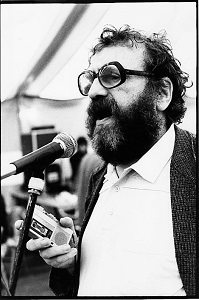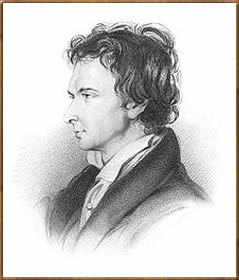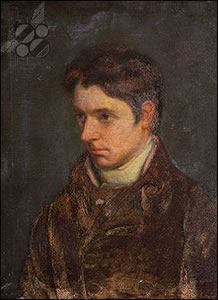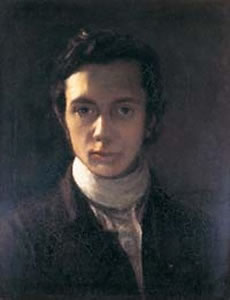De Nederlandse dichter Leo Vroman werd op 10 april 1915 in Gouda geboren. Zie ook mijn blog van 10 april 2007 en ook mijn blog van 10 april 2008.
Toen ik 12 jaar was
Toen ik 12 jaar was
hield ik het meeste
van bossen vol beesten
en van slapen in het gras.
Daar staan nu huizen, want
dat was duizend jaar geleden.
Wat bos was en weiland
is nu bebouwd en bereden.
Was ik maar een kilometer
lang, dan kon ik alles beter
overzien en misschien verdragen,
en dan kon ik mij vol behagen
uitstrekken over die daken
en die woninkjes fijn kraken
alsof ze schelpjes waren,
hun huisdiertjes uit mijn haren
kammen, miertjes die zo merkwaardig
menselijk waren
maar zoveel aardiger
zoals ook de wereld leek
wanneer ik de dom
van Utrecht beklom
en omlaag keek.
Vrouwen 2
Het mooiste in ons hele leven
doen we net als iedereen
en daarom juist het liefst alleen.
Dus wordt het krom beschreven.
Er blaast eentonige muziek
uit de annalen der erotiek
dwars door de waarheid heen.
In bed
Het is mij een droom te ontwaken
door een hand op het haar en de slapen
en de streling van zaaien en rapen
meer dromen te voelen maken;
hoor in het omhullend geruis
van een adem de zee, de wind
op een lang, leeg strand, en een kind
ver van het ouderlijk huis –
Zij vroeg mij waar we nu waren.
Het was herfst in mijn droom en ook buiten
bewegen zich dorre blaren
door de lucht, en over de ruiten.
Leo Vroman (Gouda, 10 april 1915)
De Amerikaanse schrijver Paul Edward Theroux werd geboren op 10 april 1941 in Medford, Massachusetts. Zie ook mijn blog van 10 april 2007 en ook mijn blog van 10 april 2008.
Uit: Ghost Train to the Eastern Star
“Long after I took the trip I wrote about in The Great Railway Bazaar I went on thinking how I’d gone overland, changing trains across Asia, improvising my trip, rubbing against the world. And reflecting on what I’d seen — the way the unrevisited past is always looping in your dreams. Memory is a ghost train too. Ages later, you still ponder the beautiful face you once glimpsed in a distant country. Or the sight of a noble tree, or a country road, or a happy table in a café, or some angry boys armed with rusty spears shrieking, “Run you life, dim-dim!” — or the sound of a train at night, sounding that precise musical note of train whistles, a diminished third, into the darkness, as you lie in the train, moving through the world as travelers do, “inside the whale.”
Thirty-three years went by. I was then twice as old as the person who had ridden those trains, most of them pulled by steam locomotives, boiling across the hinterland of Turkey and India. I loved the symmetry in the time difference. Time passing had become something serious to me, embodied in the process of my growing old. As a young man I regarded the earth as a fixed and trustworthy thing that would see me into my old age; but older, I began to understand transformation as a natural law, something emotional in an undependable world that was visibly spoiled. It is only with age that you acquire the gift to evaluate decay, the epiphany of Wordsworth, the wisdom of wabi-sabi: nothing is perfect, nothing is complete, nothing lasts.
“Without change there can be no nostalgia,” a friend once said to me, and I realized that wh
at I began to witness was not just change and decay, but imminent extinction. Had my long-ago itinerary changed as much as me? I had the idea of taking the same trip again, traveling in my own footsteps — a serious enterprise, but the sort of trip that younger, opportunistic punks often take to make a book and get famous. (The list is very long and includes travelers’ books in the footsteps of Graham Greene, George Orwell, Robert Louis Stevenson, Leonard Woolf, Joseph Conrad, Mister Kurtz, H. M. Stanley, Leopold Bloom, Saint Paul, Basho, Jesus, and Buddha.)”
Paul Theroux (Medford, 10 april 1941)
De Italiaanse schrijver en vertaler Claudio Magris werd geboren op 10 april 1939 in Triëst. Sinds 1978 is hij hoogleraar Duitstalige literatuur aan de universiteit in Turijn. Magris is essayist en clomnist voor de Corriere della Sera en andere Europese kranten. Zijn eerste boek ging over de mythe van de Habsburgers in de moderne Oostenrijkse literatuur. Ook schreef hij essays over Hoffmann, Roth, Ibsen, Svevo, Musil, Hesse en Borges. Zijn literaire doorbraak kwam in 1986 met Danubio (Donau), een literaire reis langs deze rivier.
Uit: Blindlings (Vertaald door Ragni Maria Gschwend)
„Mein lieber Cogoi, ehrlich gesagt, ich bin mir nicht sicher, obwohl ich es selber geschrieben habe, daß niemand das Leben eines Menschen besser erzählen könne als er selbst. Natürlich hat dieser Satz ein Fragezeichen; ja, wenn ich mich recht erinnere – inzwischen sind so viele Jahre vergangen, ein Jahrhundert, die Welt hier herum war jung, ein taufrischer grüner Morgen, aber sie war schon ein Gefängnis –, habe ich als erstes genau dieses Fragezeichen gesetzt, das alles hinter sich herzieht. Als mich Doktor Ross aufforderte, jene Seiten für das Jahrbuch zu schreiben, hätte ich große Lust gehabt –
und das wäre ehrlich gewesen –, ihm einen Stapel Blätter mit nichts als einem Fragezeichen drauf zu schicken, aber ich wollte nicht unhöflich sein, ausgerechnet ihm gegenüber, der im Unterschied zu den anderen so freundlich und wohlwollend ist; außerdem wäre es nicht angebracht gewesen, jemanden zu verärgern, der dich aus einem geschützten Winkel, wie die Redaktion des Almanachs der Strafkolonie, herausholen und in die Hölle von Port Arthur expedieren kann, wo du es mit der neunschwänzigen Katze auf den Buckel kriegst, sobald du dich, erschöpft von den Steinblöcken und dem eiskalten Wasser, auch nur für einen Augenblick auf den Boden setzt.
Also habe ich vor dieses Fragezeichen lediglich den ersten Satz geschrieben und nicht mein ganzes Leben, meines, seines oder wessen auch immer. Das Leben – pflegte unser Grammatiklehrer Pistorius zu sagen, wobei er die lateinischen Ausdrücke mit runden, gemessenen Gesten begleitete, in jenem Raum mit der roten Tapete, die sich am Abend verdüsterte und erlosch: Glut der Kindheit, die im Dunklen verglomm –, das Leben ist keine Proposition oder Assertion, sondern eine Interjektion, eine Interpunktion, eine Konjunktion, im Höchstfall ein Adverb.“
Claudio Magris (Triëst, 10 april 1939)
De Russische dichteres Bella Akhmadulina werd geboren op 10 April 1937 in Moskou. Haar schrijversloopbaan begon toen zij als journaliste ging werken voor de Moskouse krant “Metrostroevets” en zij zich aansloot bij een literaire kring rond de dichter Yevgeny Vinokurov. In 1955 verschenen haar gedichten voor het eerst in het tijdschrift October. Zij studeerde aan het Maxim Gorky instituut voor literatuur. In 1962 publiceerde zij haar eerste bundel „Struna“ (Engels:”The String,”).
“Rain Flogs My Face…”
Rain flogs my face and collar-bones,
a thunderstorm roars over musts.
You thrust upon my flesh and soul,
like tempests upon ships do thrust.
I do not want, at all, to know,
what will befall to me the next –
would I be smashed against my woe,
or thrown into happiness.
In awe and gaiety elated,
like a ship, that’s going tempests through,
I am not sorry that I’ve met you,
and not afraid to love you, too.
Day-Raphael
Oh, Stranger Day, don’t stay on those pinky hills!
Don’t let the dawn deform your features, so attractive.
Why did you condescend to my and pits’ appeals?
I recognize you there. Urbino’s your land, native.
Oh, Holly Day, go back to Italy of yours,
There’s still a winter here, and our men make a trouble,
A jealous hunchbacked dwarf, I look at you, quite lost,
And kiss tails of your garb – quite serious and humble.
So, is it not enough – the pocked cheeks and lungs?
To add, the silly brush and paints, despising orders.
Oh, Day-Perfection, pray go away at once!
Our shepherdess conceals a knife under her bodice.
But kindly looked at us the godlike Day, again.
And brothers told mid them: “Brother, please meet my bow!”
And aft the hundred years, the Day of Our Saint,
For three our hamlets, poor, had passed without a row.
Unmarked, had gone away Day-Light, Day-Raphael…
But flourished the dead oak amidst the plaintive vastness,
And over our heads, the blissful sunset spelled,
And pilgrims crossed themselves at ruins in the darkness.
Vertaald door Yevgeny Bonver
Bella Akhmadulina (Moskou, 10 April 1937)
De Duitse schrijver Stefan Heym (eig. Hellmuth Flieg) werd geboren op 10 april 1913 in Chemnitz. . Zie ook mijn blog van 10 april 2007 en ook mijn blog van 10 april 2008.
Uit: Die Architekten
“Bald würden sie in Brest eintreffen, hörte er einen der Wachposten sagen. Die Posten spielten Domino; sie hieben ihre kleinen schwarzen Steine krachend auf ein Brett, das sie sich quer über die Knie gelegt hatten, und rauchten Machorka. Der Waggon, für Güter und Pferde gedacht, nicht für Menschen, ratterte über die ausgefahrenen Gleise, und der Geruch nach Schweiß und Angst wollte sich nicht verziehen, obwohl die Belüftungsklappen unter dem Dach so weit es ging offenstanden und sogar die Ladetür in der Seitenwand um einen Spaltbreit beiseite geschoben worden war.
Brest, dachte er. Seit vergangenem Jahr – soviel war durch Gefängnismauern und über die sibirische Taiga gedrungen – waren Stadt und Festung Brest wieder sowjetisch. Jenseits von Brest lag die neue Grenze, lag das Großdeutschland der Nazis.
Die Unruhe, die ihn zermürbte, seit er erfahren hatte, daß er aus der Sowjetunion abgeschoben werden sollte, schien sich auf einen einzigen Brennpunkt in seinem Innern zu konzentrieren; und es kostete ihn viel Nervenkraft, um wenigstens ein Minimum an Gleichgewicht in seinem Herzen zu wahren: Was, im Grunde, würde dem Genossen Julian Goltz denn Schlimmeres widerfahren als eine Art von Strafversetzung aus der Bratpfanne ins Feuer. Mit seinem Leben hatte er sowieso abgeschlossen.
Der Tod von Babette, so grausam der Gedanke ihm auch erschien, hatte zugleich auch das Ende der Sorgen um seine Frau bedeutet; nur die Angst um Julia war geblieben, doch war sogar auch diese Angst nun leichter zu ertragen, da er hoffen durfte, daß Sundstrom, mit seinem Talent und seinen Beziehungen, einer Verhaftung entgangen war und so sich des Kindes annehmen konnte.”
Stefan Heym (10 april 1913 – 16 december 2001)
De Duitse schrijver Richard Wagner werd geboren op 10 april 1952 in Lowrin, in Roemenië. Zie ook mijn blog van 10 april 2007 en ook mijn blog van 10 april 2008.
Uit: Der leere Himmel
“Regenschirmmörder, Papstattentat und Terrorschickeria.
Der Balkan, konnte man denken, ist weit weg, irgendwo und unwichtig. Das meiste war ohnehin Folklore. Postkartenkloster. Verdrängt vom Exterritorialen der Strände und Bergtouren. Der Tourismus hat den Hang zum Exterritorialen, er ist gesellschaftsabgewandt. Da helfen auch keine Kulturprogramme über Schönheiten, Sehenswürdigkeiten und Reichtümer der stolzen Einheimischen. Tourismus bedeutet Pflege der Klischees. Familienfreundlich ans Schwarze Meer. Deutsch-deutsch, vereint am bulgarischen Goldstrand, im rumänischen Eforie. Länder, in denen man sich über die deutsche Teilung hinweg begegnen konnte, weil dort auch die Brüder und Schwestern hinfahren durften, sofern sie einen Urlaubsplatz zugeteilt bekamen. Ans schwarze Meer, wo sie dann Deutsche Zweiter Klasse waren, weil sie das falsche Geld im Portemonnaie hatten. Unsere Deutschen, wie die Bulgaren lakonisch sagten. Und der dazugehörige Blick verriet die kleine Freude, die sie bei dieser Geste der Demütigung verspürten.
Und dann die Medienschnipsel. Balkan, anekdotisch. Ceausescu, der mutige Gegner Moskaus, der sich nicht am Einmarsch der Sowjets in Prag beteiligt hatte. Der in Bukarest eine Rede vom Balkon des Zentralkomitees herunter hielt, in der er den Einmarsch öffentlich verurteilte. Die moskautreuen Bulgaren dagegen, deren Geheimdienst in dunkler Weise mit dem Papstattentat zu tun hatte und Regenschirmmörder beschäftigte. Mit einer mit Rizin vergifteten Regenschirmspitze wurde 1978 auf der Waterloo Bridge in London ein bekannter bulgarischer Schriftsteller und Dissident attackiert. Georgi Markov verstarb nach ein paar Tagen im Krankenhaus an den Folgen der Vergiftung. Markov lebte seit 1969 im Westen. Seine Beiträge für Radio Free Europe, BBC und Deutsche Welle waren in Bulgarien besonders beliebt. Sie sollen Zivkov, den Markov wegen seines autoritären Führungsstils brandmarkte, persönlich gestört haben.”
Richard Wagner (Lowrin, 10 april 1952)
De Engelse schrijver en essayist William Hazlitt werd geboren op 10 april 1778 in Maidstone. Zie ook mijn blog van 10 april 2007 en ook mijn blog van 10 april 2008.
Uit: On the Pleasure of Hating
“Where there’s a will, there’s a way – I said to myself, as I walked down Chancery-lane, about half-past six o’clock on Monday the l0th of December, to inquire at Jack Randall’s where the fight the next day was to be; and I found ’the proverb’ nothing ‘musty’ in the present instance. I was determined to see this fight, come what would, and see it I did, in great style. It was my first fight, yet it more than answered my expectations. Ladies – it is to you I dedicate this description; nor let it seem out of character for the fair to notice the exploits of the brave. Courage and modesty are the old English virtues; and may they never look cold and askance on one another! Think, ye fairest of the fair, loveliest of the lovely kind, ye practisers of soft enchantment, how many more ye kill with poisoned baits than ever fell in the ring; and listen with subdued air and without shuddering, to a tale tragic only in appearance, and sacred to the FANCY!”

William Hazlitt (10 april 1778 – 18 september 1830)
De Amerikaanse schrijver Lew Wallace werd geboren in Brookville, Indiana, op 10 april 1827. Hij is vooral bekend geworden door zijn historische roman Ben-Hur. Wallace was advocaat en bracht het in de Amerikaanse Burgeroorlog tot generaal, waarin hij o.a. vocht in de Slag om Fort Donelson en de Slag bij Shiloh onder Ulysses S. Grant. Na de oorlog werd hij gouverneur van de staat New Mexico (1878-1881) en diende van 1881 tot 1885 als gezant in Turkije. Hij publiceerde zijn eerste boek, The fair God, ook een historische roman, in 1873. Ben Hur: A tale of the Christ verscheen in 1880 en werd een ongekende bestseller en later ook een beroemde film.
Uit: Ben-Hur
„The litter swayed, and rose and fell like a boat in the waves. Dried leaves in occasional beds rustled underfoot. Sometimes a perfume like absinthe sweetened all the air. Lark and chat and rock-swallow leaped to wing, and white partridges ran whistling and clucking out of the way. More rarely a fox or a hyena quickened his gallop, to study the intruders at a safe distance. Off to the right rose the hills of the Jebel, the pearl-gray veil resting upon them changing momentarily into a purple which the sun would make matchless a little later. Over their highest peaks a vulture sailed on broad wings into widening circles. But of all these things the tenant under the green tent saw nothing, or, at least, made no sign of recognition. His eyes were fixed and dreamy. The going of the man, like that of the animal, was as one being led. For two hours the dromedary swung forward, keeping the trot steadily and the line due east.“
Lew Wallace (10 april 1827 – 15 februari 1905)
De Amerikaanse schrijver Eric Knight werd geboren op 10 april 1897 in Menston in Yorkshire, Engeland. Hij trok echter al vroeg met zijn ouders naar Zuid-Afrika waar zijn vader als diamanthandelaar werkte. Toen zijn moeder na diens dood hertrouwde met een Amerikaan kwam Knight in Massachusetts te wonen. Hij studeerde kunst aan de New York National Academy of Design. Daarna schreef hij voor kranten, o.a. filmrecensies. In 1932 kochten hij en zijn vrouw een farm in Springtown, Pennsylvania, waar zij collies en andere honden fokten. Terug in New York begon Knight aan het korte verhaal Lassie, dat voor het eerst verscheen op 17 december 1938 in The Saturday Evening Post. Het werd snel populair. In 1940 verscheen het boek dat een bestseller werd en in 24 talen verscheen. MGM kocht de filmrechten en in 1943 kwam de film Lassie Come Home uit met de 10-jarige Elizabeth Taylor. Meer series en films volgden
Uit: Lassie Come-Home
„Greenall Bridge was like other Yorkshire villages. Its men knew and understood and loved dogs, and there were many perfect ones that walked at men’sheels. But they all agreed that if a finer dog than Sam Carraclough’s tricolor collie had ever been bred in Greenall Bridge, then it must have been long before they were born. But there was another reason why Lassie was so well known in the village. Itwas because, as the women said, “You can set your clock by her.” That had begun many years before, when Lassie was a bright, harum-scarum yearling. One day Sam Carraclough’s boy, Joe, had come home bubbling with excitement. “Mother! I come out of school today, and who do you think was sitting there waiting for me? Lassie! Now how do you think she knew where I was?” “She must have picked up thy scent, Joe. That’s all I can figure out.” Whatever it was, Lassie was waiting at the school gate the next day, and the next. The weeks and the months and the years had gone past, and it had always been the same. Women glancing through the windows of their cottages, or shopkeepers standing in the doors of High Street, would see the proud black,white, and golden-sable dog go past on a steady trot, and would say:“Must be five to four–there goes Lassie!” Rain or shine, the dog was always there, waiting for a boy–one of dozens who would come pelting across the playground–but for the dog, the only one who mattered. Always there would be the moment of happy greeting, and then, together, the boy and the dog would go home. For four years it had always been the same.“

Eric Knight (10 april 1897 – 14 januari 1943)
Portret door Peter Hurd
De Amerikaanse dichter Byron Forceythe Willson werd geboren op 10 april 1837 in Little Genesee, New York.Getroffen door tbc kon hij zijn studie aan Harvard niet afmaken. Hij werd redacteur bij de the Louisville Journal, waarin hij ook zijn bekendste gedicht „The Old Sergeant,” voor het eerst publiceerde.
The Old Sergeant (Fragment)
“COME a little nearer, Doctor,—thank you,—let me take the cup:
Draw your chair up,—draw it closer,—just another little sup!
May be you may think I ’m better; but I ’m pretty well used up:—
Doctor, you’ve done all you could do, but I ’m just a going up!
“Feel my pulse, sir, if you want to, but it ain’t much use to try:”—
“Never say that,” said the Surgeon as he smothered down a sigh;
“It will never do, old comrade, for a soldier to say die!”
“What you say will make no difference, Doctor, when you come to die.
“Doctor, what has been the matter?” “You were very faint, they say;
You must try to get to sleep now.” “Doctor, have I been away?”
“Not that anybody knows of!” “Doctor—Doctor, please to stay!
There is something I must tell you, and you won’t have long to stay!
Forceythe Willson (10 april 1837 – 2 februari 1867)
Oude winkel in Little Genesee (Geen portret beschikbaar)




























